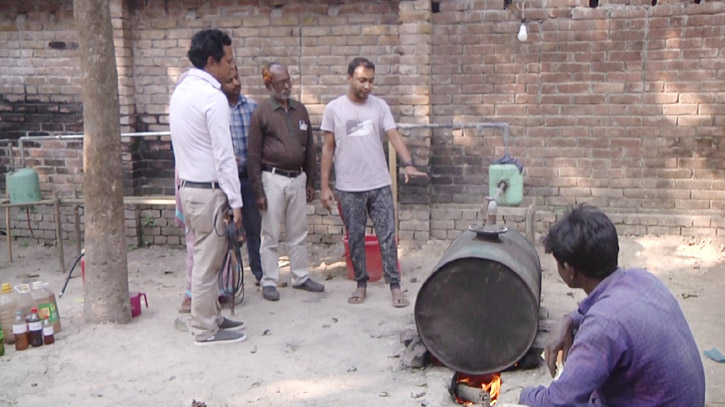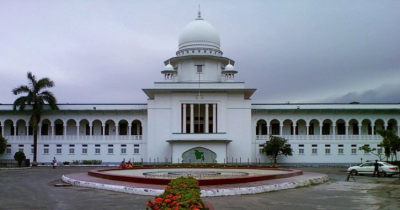
Photo: TDM
Mazharul Islam, a young entrepreneur hailing from Mithapukur in Rangpur, has taken an innovative approach to tackle the problem of waste polyethylene and plastic materials while providing a low-cost means of producing energy. His project involves extracting diesel, petrol, octane, and printing ink from abandoned polyethylene using indigenous technology learned from the internet.
Mazharul has set up a factory in his backyard where he vaporizes the abandoned polyethylene in a drum reactor at temperatures of up to 500 degrees Celsius. The resulting gas is then condensed into different types of fuel at varying temperatures in separate cylinders. The remaining vapors are used as fuel for the vaporization process, and the carbon residue is collected as printing ink. Mazharul claims that 10 kg of polyethylene can yield up to eight liters of fuel, including 5 liters of diesel, 2 liters of petrol, and 1 liter of octane, at a maximum production cost of 60 taka per liter.
His project has gained popularity as it not only addresses the issue of waste polyethylene but also provides an affordable means of producing energy. Local customers who have used the fuel produced by Mazharul have given positive feedback on its quality and performance. Motorcyclists, farmers, and power-tiller operators have expressed satisfaction with the fuel, citing its low price and good performance in their machines.
Despite successfully producing 55 liters of fuel in the last month, Mazharul faces limitations in scaling up production due to financial constraints. He is hopeful that the government or wealthy individuals will come forward to support his initiative, enabling him to expand his production commercially. This would not only contribute to a polythene-free environment but also provide affordable fuel options for consumers during the ongoing energy crisis.
However, Petrobangla, the state-owned oil, gas, and mineral resources corporation, has raised concerns about the invention and called for laboratory tests to confirm the composition of the fuel produced from polyethylene. Rashedul Islam, Deputy Manager (Operations) of Jamuna Oil Company and Representative Engineer of India Bangladesh Pipeline, explained that the composition of polyethylene is different from that of traditional fuels like diesel and petrol, and further testing is required to ascertain its suitability as fuel.
Mazharul Islam's innovative approach to tackling polythene waste and producing energy has shown promising results. However, further testing and support may be needed to establish its commercial viability. Nevertheless, his efforts have been positively received by local customers who have benefited from the affordable fuel options and good performance in their machines.
Mazharul's project also has the potential to have a positive impact on the environment by addressing the issue of waste polyethylene and providing an alternative source of energy. Polyethylene and plastic materials are notorious for their negative impact on the environment, as they are non-biodegradable and often end up clogging drains and causing pollution. By converting abandoned polyethylene into fuel, Mazharul is not only reducing plastic waste but also providing a sustainable source of energy.
Furthermore, Mazharul's initiative has the potential to create job opportunities in the local community, especially if he is able to scale up production and expand his venture commercially. This could contribute to the economic development of the region and improve the livelihoods of local residents.
In conclusion, Mazharul Islam's innovative project of extracting fuel from waste polyethylene and plastic materials has gained popularity for its potential to address the issue of plastic waste and provide affordable energy options. Despite facing limitations in scaling up production, Mazharul's efforts have been positively received by local customers and have the potential for further development with adequate support and testing. His initiative not only contributes to a polythene-free environment but also has the potential for economic and social benefits in the local community.
TDM/MI








